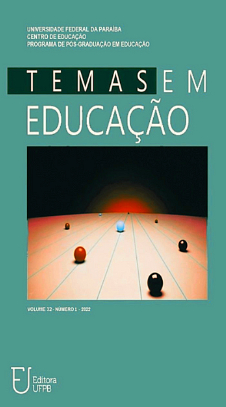GRADUATE PROGRAM IN EDUCATION OF THE UNIVERSIDADE FEDERAL DA PARAÍBA (PPGE/UFPB):
BETWEEN CELEBRATION AND REMEMBRANCE (1977-1994)
DOI:
https://doi.org/10.22478/ufpb.2359-7003.2023v32n1.66821Keywords:
Graduate Program in Education, Celebration, RemembranceAbstract
This article intended to disseminate the first analyzes and impressions regarding the constitution and initial trajectory of the Graduate Program in Education of the Universidade Federal da Paraíba (PPGE/UFPB), in favor of Popular Education, between 1977 and 1994. Fulfilling this intention, the following questions were asked: what do historical sources reveal about the Program? What are the first impressions about the identity and social place of the institution, between 1977 and 1994? Why celebrate and remember the initial trajectory of the PPGE/UFPB? From this perspective, bibliographical research and analysis of written memories of historical sources were used as methodology: CONSEPE's Resolution 47º/1977, the Selection Map (profile of candidates) from 1987 to 1994 and the commemorative book marking the 30th anniversary of the Program, dialoguing with Lampert (2000), Saviani (2008), Ferreira (2012), among other authors. As a result, the frame mobilization of the Program in the survey of sources and reflections about the limits of the acts of celebration and remembrance in the celebrative work and in the writing of the first impressions about the History and Memories of the PPGE/UFPB was evidenced.
Downloads
References
BENJAMIN, Walter. O Narrador. In: BENJAMIN, Walter. Magia e Técnica, Arte e Política - ensaios sobre literatura e história da cultura. Obras escolhidas, volume I, 2. ed., São Paulo: Editora Brasiliense, 1994, p.197-221.
BRANDÃO, Carlos Rodrigues. O que é educação popular. São Paulo: Brasiliense, 2006.
BRASIL. Lei nº 4.024, de 20 de dezembro de 1961. Fixa as diretrizes e bases da educação nacional. Lei de Diretrizes e Bases da Educação-LDB. Brasília, DF, 1961. Disponível em: https://www2.camara.leg.br/legin/fed/lei/1960-1969/lei-4024-20-dezembro-1961-353722-publicacaooriginal-1-pl.html. Acesso em: 17 mar. 2023.
BRASIL. Lei nº 5.540, de 28 de novembro de 1968. Fixa normas de organização e funcionamento do ensino superior e sua articulação com a escola média, e dá outras providências. Lei da Reforma Universitária de 1968. Brasília, DF, 1968. Disponível em: https://www2.camara.leg.br/legin/fed/lei/1960-1969/lei-5540-28-novembro-1968-359201-publicacaooriginal-1-pl.html. Acesso em: 22 mar. 2023.
BRASIL. Parecer 977, de 3 de dezembro de 1965.Definição dos cursos de Pós-Graduação. Revista Brasileira de Educação, set-dez, nº30, 2005. Disponível em: https://www.scielo.br/j/rbedu/a/NsLTtFBTJtpH3QBFhxFgm7L/?format=pdf&lang=pt. Acesso em: 15 mar. 2023.
CHARTIER, Roger. O mundo como representação. Estud. av. [online]. v.5, n.11, p.173-191, 1991.
DIAS, Adelaide Alves; PINHEIRO, Antônio Carlos Ferreira. Apresentação. PPGE – UFPB: 30 anos de história. Pesquisa e compromisso com a educação destinada às camadas populares. In: RODRIGUES, Janine Marta.C. et al. (org.) Pesquisa em educação na Paraíba: 30 anos (1977-2007). Compromissos com a educação dos setores esquecidos da sociedade. João Pessoa: Editora Universitária da UFPB, 2007, p.19-22.
FARIA FILHO, Luciano Mendes de. A legislação escolar como fonte para a História da Educação: uma tentativa de interpretação. Duarte, Regina Horta et al (org.). Educação, modernidade e civilização. Belo Horizonte: Autêntica, 1998, p.89-125.
FERREIRA, Lúcia de Fátima Guerra. Histórias de repressão em tempo de expansão: a UFPB durante a Ditadura Militar. In: TOSI, Giuseppe et al (org.). Direitos Humanos: Educação Memória e Democracia/E-book para alunos e professores da UFPB [recurso eletrônico]. João Pessoa: Editora do CCTA, 2020. v.1, p. 164-181.
FERREIRA, Marieta de Moraes. Demandas sociais e história do tempo presente. In: VARELLA, Flávia et al (org.). Tempo presente & usos do passado. Rio de Janeiro: FGV, 2012, p.101-124.
GHIRALDELLI JUNIOR, Paulo. História da educação. 2 ed. São Paulo: Cortez, 2000, p.240.
GONÇALVES, Nadia Gaiofatto. Constituição histórica da educação no Brasil. Curitiba: Intersaberes, 2012, p.186.
LAMPERT, Ernâni. A Pós-Graduação brasileira: retrospectiva histórica e perspectivas para o século XXI.. In: LAMPERT, Ernâni (org.). Educação brasileira: desafios e perspectivas para o século XXI. Porto Alegre: Sulina, 2000, p.184.
PEREIRA, Dulcinéia de Fátima Ferreira; PEREIRA, Eduardo Tadeu. Revisitando a história da educação popular no Brasil: em busca de um outro mundo possível. Revista HISTEDBR [on-line]. Campinas, SP, v. 10, n. 40, p. 72–89, 2010.
SAVIANI, Dermeval. O legado educacional do regime militar. Cad. Cedes. Campinas, v. 28, n.78 p. 291-312, 2008.
SILVA, Helenice Rodrigues. Rememoração/comemoração: as utilizações sociais da memória. Revista Brasileira de História. São Paulo.v.22, n.44, p.425-438, 2002.
STEPHANOU, Maria; BASTOS, Maria Helena Camara. História, Memória e História da Educação. In: STEPHANOU, Maria; BASTOS, Maria Helena Camara (org.). Histórias e Memórias da Educação no Brasil: Século XX. Petrópolis, RJ: Vozes, v. 3, 2005, p.416-430
Downloads
Published
How to Cite
Issue
Section
License
Copyright (c) 2023 Revista Temas em Educação

This work is licensed under a Creative Commons Attribution 4.0 International License.
Authors who publish in this journal agree to the following terms:
. Authors retain the copyright and grant the journal the right to first publication, with the work simultaneously licensed under the Licença Creative Commons Attribution that allows the sharing of the work with acknowledgment of authorship and initial publication in this magazine. . Authors are authorized to assume additional contracts separately, for non-exclusive distribution of the version of the work published in this journal (eg, publishing in institutional repository or as a book chapter), with acknowledgment of authorship and initial publication in this journal.
. Authors are permitted and encouraged to publish and distribute their work online (eg in institutional repositories or on their personal page) at any point before or during the editorial process, as this can generate productive changes, as well as increase impact and citation of the published work (See O Efeito do Acesso Livre).



















